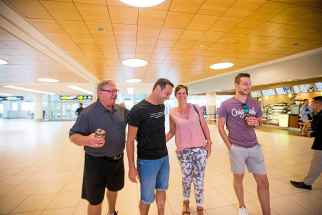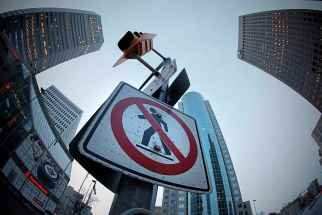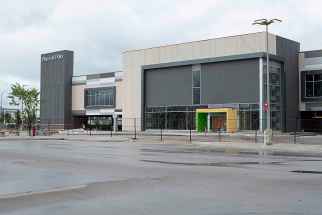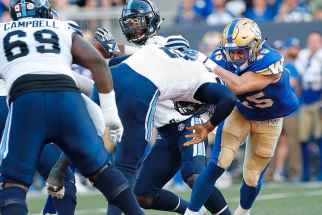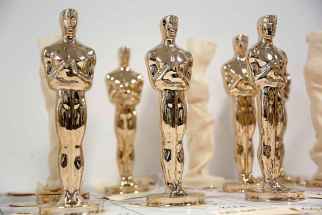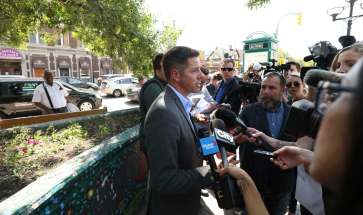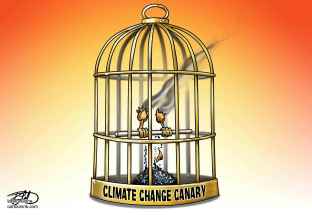Blood brothers One man's selfless donation gave another man life
Read this article for free:
or
Already have an account? Log in here »
To continue reading, please subscribe:
Monthly Digital Subscription
$0 for the first 4 weeks*
- Enjoy unlimited reading on winnipegfreepress.com
- Read the E-Edition, our digital replica newspaper
- Access News Break, our award-winning app
- Play interactive puzzles
*No charge for 4 weeks then price increases to the regular rate of $19.00 plus GST every four weeks. Offer available to new and qualified returning subscribers only. Cancel any time.
Monthly Digital Subscription
$4.75/week*
- Enjoy unlimited reading on winnipegfreepress.com
- Read the E-Edition, our digital replica newspaper
- Access News Break, our award-winning app
- Play interactive puzzles
*Billed as $19 plus GST every four weeks. Cancel any time.
To continue reading, please subscribe:
Add Free Press access to your Brandon Sun subscription for only an additional
$1 for the first 4 weeks*
*Your next subscription payment will increase by $1.00 and you will be charged $16.99 plus GST for four weeks. After four weeks, your payment will increase to $23.99 plus GST every four weeks.
Read unlimited articles for free today:
or
Already have an account? Log in here »
Hey there, time traveller!
This article was published 09/08/2018 (2681 days ago), so information in it may no longer be current.
For days, he had thought about what he was going to say, obsessed over it, really. In his mind, it had to be perfect. But in the end, Winnipegger Jamie Benzelock was almost speechless as he faced, for the first time, the kind-hearted stranger from half a world away who had saved his life.
A big, strong embrace, one that seemed to last forever, conveyed everything.
“How do you say thank you to someone like this? Thank you doesn’t seem to do it justice,” a teary-eyed Benzelock said Thursday morning after the emotional scene at the Winnipeg airport, just steps away, fittingly, from the “hug rug.”
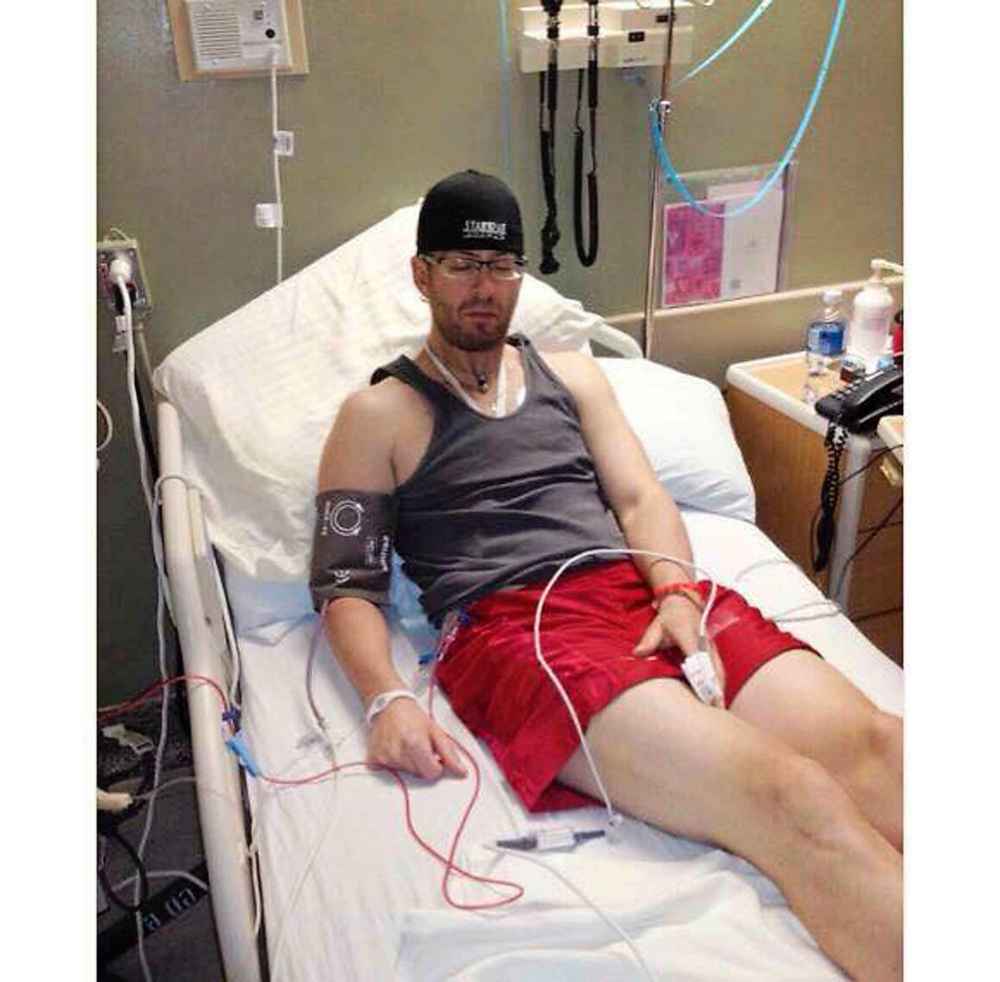
Benzelock, 42, had finally met Marco Kiunka, the German man who, in 2014, was found to be his stem cell match. His generous donation cured Benzelock’s severe congenital neutropenia, which he’d been diagnosed with as an infant in 1976.
“It’s a blessing. It’s a gift. And it’s one I can never repay,” said Benzelock. “This is a new lease, a second chance.”
Kiunka, 48, made his first visit to Canada this week, arriving in Winnipeg Tuesday, along with his wife, Nicole, and son, Noah. They were expecting to meet Benzelock Wednesday evening, but his flight from Washington D.C., where he attends college, was delayed until Thursday.
What’s a few more hours when it had already been four years?
“I was so nervous and scared,” Kiunka told the Free Press of their long-awaited meeting with the man he refers to as his “genetic twin.”
“It’s more than friends,” he said.
People with neutropenia, also known as Kostmann’s syndrome, have an abnormally low level of neutrophils, a common type of white blood cell that fights bacterial infections. So much of Benzelock’s life was spent wrapped in a figurative bubble, along with countless hospital and doctor visits for a raft of tests.
He developed vasculitis, an inflammation of blood vessels that put his organs at risk. Side-effects include leukemia and myelodysplastic syndrome, a group of cancers in which blood cells in the bone marrow do not mature and therefore do not become healthy blood cells. He constantly had painful canker sores in his mouth, sometimes as many as nine at a time, along with boils and blisters and the constant threat of bleeding.
It was a living nightmare that he was forced to endure for nearly four decades. Then, developments in medical science opened the door to stem cell donation.
In early 2014, Benzelock got the call that a match had been found. He knew nothing about the donor, not even the gender or location. He underwent a lengthy, month-long hospitalization that spring in which chemotherapy was done to “wipe my whole system clean.”
Then the bag of blood — which he jokingly calls it the “good German blood” — arrived. He recalls noticing how small it was. A small bag that held a huge opportunity.
A few expected infections and reactions followed, but his body accepted the magical gift, and suddenly, the many obstacles he had faced were gone.
He had no idea who to thank.
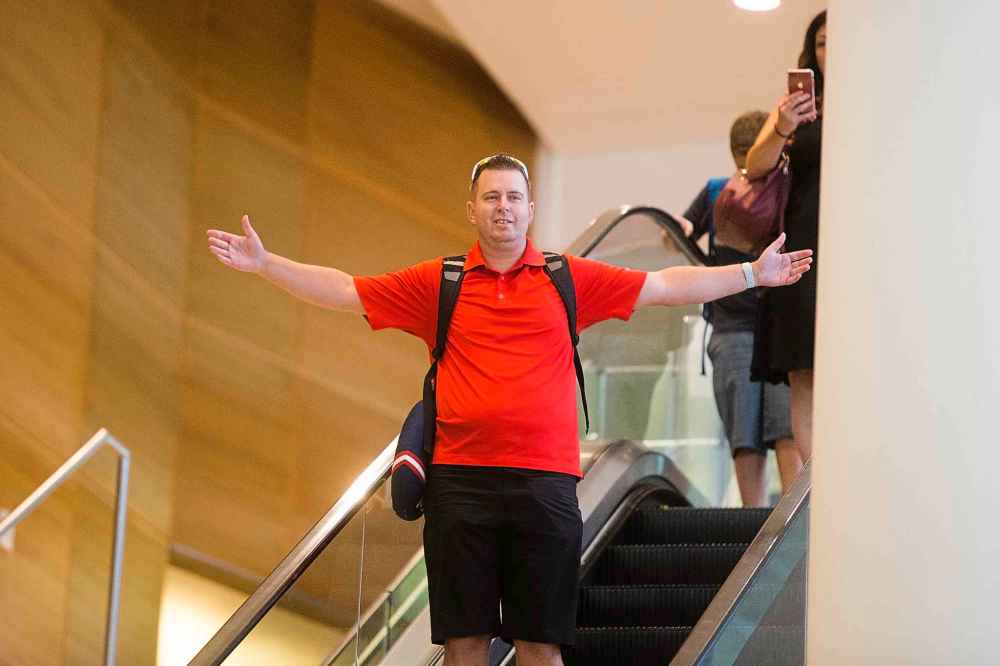
Donor regulations require that all parties wait two years until they can learn each other’s identity. So the clock ticked down, and in the spring of 2016, Benzelock got a call from CancerCare Manitoba.
He jumped at the chance to receive the information, just as Kiunka had done.
“I wanted to know him, to say hello,” Kiunka said Thursday. He had initially been told the match was a middle-aged man in Canada, but was given no other details. Now he can’t get enough information.
“I’m proud of him, that he’s gotten healthy. Not everybody gets healthy. So I’m very proud,” said Kiunka.
Benzelock and Kiunka first chatted by email, then by telephone. Benzelock even got him to set up a Facebook account to make it easier. They learned about each other, their families, and cherished the bond between them.
Then they made plans to meet. At the airport Thursday, Benzelock was joined by his fiancée and stepson.
Here’s how to become a stem cell donor in Canada
Call 1-888-2DONATE (1-888-236-6283) or visit the Canadian Blood Services website (www.blood.ca) to begin the process through their “OneMatch” program.
“If you’re found to be a potential match, we will contact you. With the guidance of a registered nurse —your case manager — you’ll go through a comprehensive health assessment before you donate to make sure you can safely proceed and that your health background does not pose a risk to the patient. The nurse performs this assessment over the phone,” the website states.
Call 1-888-2DONATE (1-888-236-6283) or visit the Canadian Blood Services website (www.blood.ca) to begin the process through their “OneMatch” program.
“If you’re found to be a potential match, we will contact you. With the guidance of a registered nurse —your case manager — you’ll go through a comprehensive health assessment before you donate to make sure you can safely proceed and that your health background does not pose a risk to the patient. The nurse performs this assessment over the phone,” the website states.
“A physician conducts a thorough physical assessment at the nearest collection centre—the hospital where you will donate your stem cells—and you’ll also be tested to confirm that you have no infectious diseases. Once you are confirmed as medically eligible and you agree to proceed, the patient will be notified and will start his or her pre-transplant treatments.”
There are two kinds of donations — peripheral stems cells or bone marrow stem cells.
With peripheral stem cells, “your blood is drawn through a needle in a non-surgical procedure done at the hospital. After the stem cells are separated from the blood, the rest is returned back to your body through another needle. To increase the number of blood stem cells in your bloodstream, you will receive daily under-the-skin injections of granulocyte colony stimulated factor (G-CSF) for five days before the donation,” according to CBS.
Bone and muscle pain are the most common side effects, usually mild and brief in duration.
If a bone marrow stem cell donation is made, it’s a surgical procedure performed under anesthesia. “Hollow needles withdraw stem cells from your bone marrow from the back of your pelvic bones. The procedure lasts 45 to 90 minutes,” according to CBS.
Pain, infection and bruising are among the potential side-effects.
“A variety of diseases and disorders are treated with stem cell transplants, including blood-related diseases such as leukemia, aplastic anemia, and inherited immune system and metabolic disorders,” CBS said.
“It may be days, weeks, months or even years before you get the call to become a donor, which is why it’s important to be prepared to commit for the long term.”
Benzelock has less than two years of studies left at the University of the District of Columbia, where he’s completing his elementary education degree. Kiunka, who works in engineering, has already helped him with one big assignment, a project meant to educate others about the merits of stem cell donation. Kiunka sent a video confessional for Benzelock to include.
“I was tearing up. I had classmates that were crying. They were like, you’d never know you were that sick. But I don’t broadcast it,” said Benzelock.
His parents, Jim and Janice, spent more than 25 years learning everything they could about neutropenia, raising money and public awareness. They were both on hand Thursday to see their son meet his donor.
“It’s just incredible that someone from around the world…” Jim Benzelock said, his voice cracking. “He’s healthy as a horse now.”
Kiunka and his entire family had registered as potential stem cell donors following a public plea in Germany for an infant who needed a transplant. His help wasn’t required in that case, but he was thrilled when his number was eventually called.
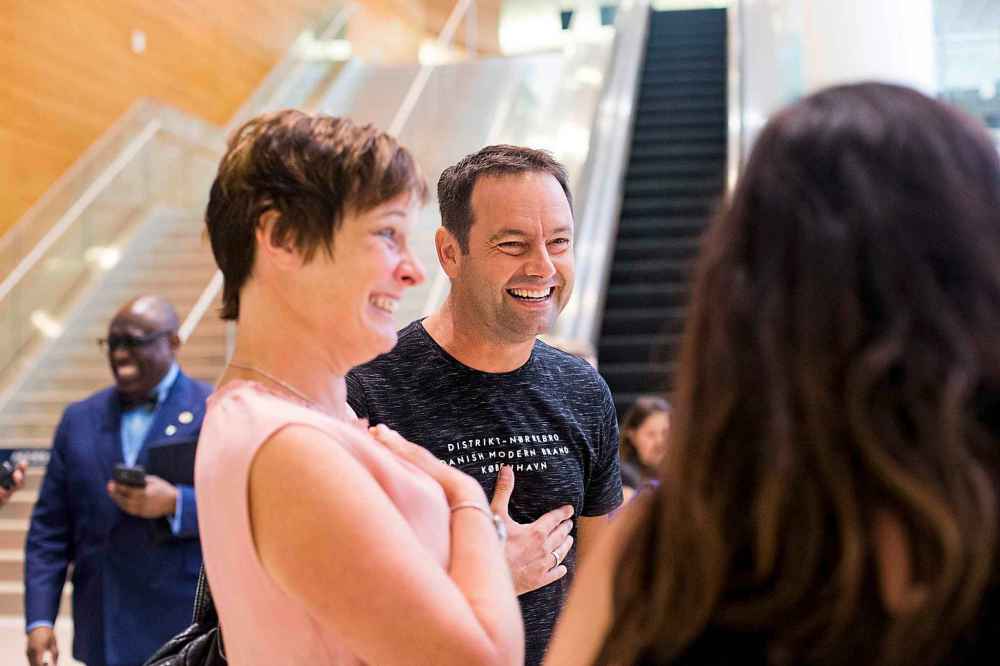
“For me, it was an easy thing to be a donor. Everyone can be one. It’s just a few hours in the clinic and then you go home. You’re finished,” Kiunka said of the painless procedure.
Turns out he’s set a great example within his own family.
“I’m very proud of him. It’s not so much work, and if you can help some people then why not?” said his son, Noah.
They’ll enjoy these next few days together in Winnipeg, and are already talking about Benzelock going to Germany once he finishes his degree.
“I had the dream to become a teacher. This was one of those things that had to be put on hold. But now that the process is complete…if it wasn’t for Marco, none of this would have happened. I’m probably not here,” said Benzelock.
“You’re so blessed and thankful for the years that you get. And then when something like this amazing gift that a stranger gives to you, it reverberates throughout your entire life, your family and friends. The life you’ve built up over the years. I’ve got friends who want to line up around the block to give him hugs.”
They’ll have to get in line, behind him.
mike.mcintyre@freepress.mb.ca
Twitter: @mikemcintyrewpg

Mike McIntyre grew up wanting to be a professional wrestler. But when that dream fizzled, he put all his brawn into becoming a professional writer.
Our newsroom depends on a growing audience of readers to power our journalism. If you are not a paid reader, please consider becoming a subscriber.
Our newsroom depends on its audience of readers to power our journalism. Thank you for your support.

